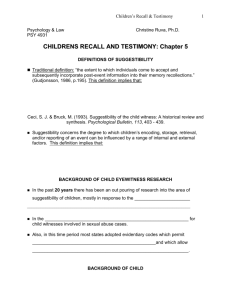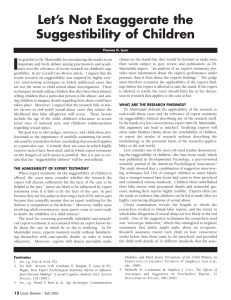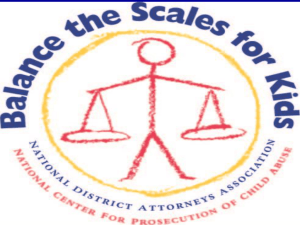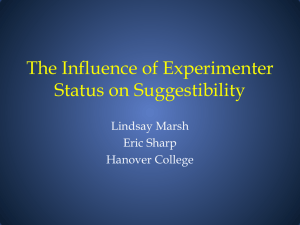Overcoming Untrue Defenses in Sexual Abuse Cases NCPCA
advertisement
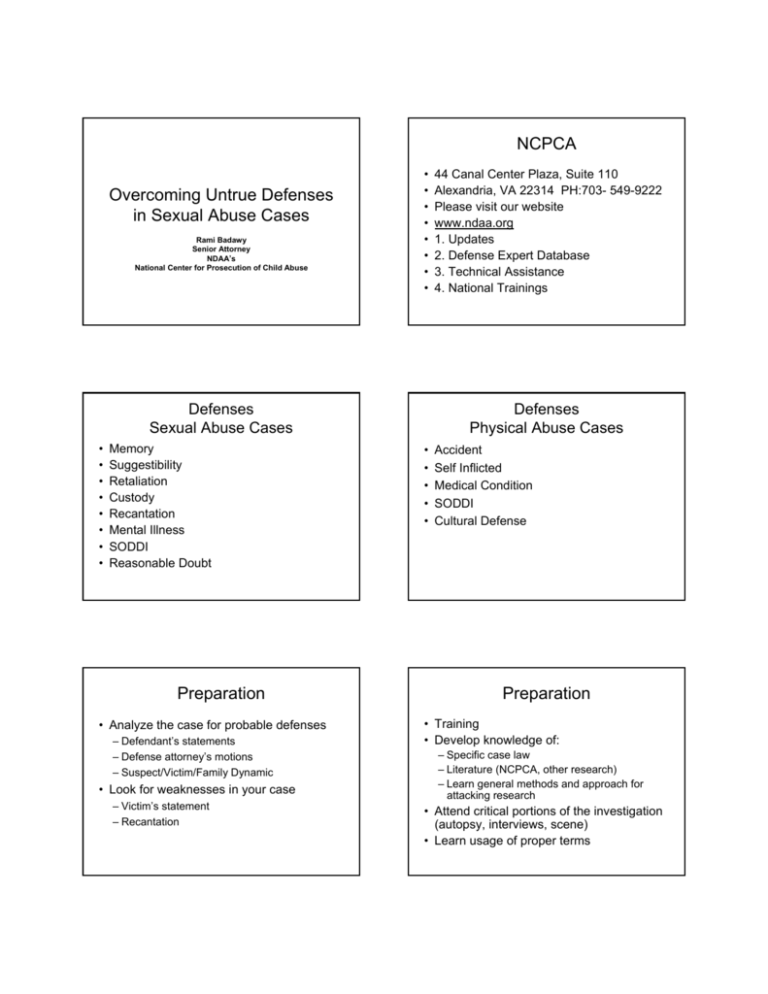
NCPCA Overcoming Untrue Defenses in Sexual Abuse Cases Rami Badawy Senior Attorney NDAA’s National Center for Prosecution of Child Abuse • • • • • • • • Defenses Sexual Abuse Cases • • • • • • • • Memory Suggestibility Retaliation Custody Recantation Mental Illness SODDI Reasonable Doubt Preparation • Analyze the case for probable defenses – Defendant’s statements – Defense attorney’s motions – Suspect/Victim/Family Dynamic • Look for weaknesses in your case – Victim’s statement – Recantation 44 Canal Center Plaza, Suite 110 Alexandria, VA 22314 PH:703- 549-9222 Please visit our website www.ndaa.org 1. Updates 2. Defense Expert Database 3. Technical Assistance 4. National Trainings Defenses Physical Abuse Cases • • • • • Accident Self Inflicted Medical Condition SODDI Cultural Defense Preparation • Training • Develop knowledge of: – Specific case law – Literature (NCPCA, other research) – Learn general methods and approach for attacking research • Attend critical portions of the investigation (autopsy, interviews, scene) • Learn usage of proper terms Memory/Suggestibility Memory • Code • Retain • Retrieve Memory/Suggestibility What is suggestibility? • The degree to which one’s memory or recounting of a event is influenced by suggested information or misinformation – Actual changes or distortions in memory – Alterations in the recounting of the event without an actual change in memory Memory/Suggestibility Memory/Suggestibility Children and History Salem Witch Trials • “The prevailing legal attitude for the following 300 years has been one of skepticism about the testimony of child witnesses” Stephen Ceci & Maggie Bruck, Suggestibility of the Child Witness: A Historical Review and Synthesis, 113 Psychological Bulletin 403, 405 (1993) • Highly suggestible • Wholly unreliable • Salem witch trials 1692 Memory/Suggestibility Memory/Suggestibility Children Ten+ Not More Suggestible Than Adults • “[P]rosecutors are reluctant to bring to court cases that rely primarily on a young child’s eyewitness testimony, presumably because of burden-of-proof problems and a suspicion that jurors have negative stereotypes about children’s memories” S.J. Ceci, D.F. Ross, M.P. Toglia, EDS Perspectives on Children’s Testimony 101 (1989) • By the time children reach approximately age 10 to 12, they appear to be generally no more suggestible than adults (Saywitz & Snyder, 1993; Saywitz, Goodman, & Lyon, 2002; Cole & Loftus, 1987). • Saywitz, K. J., & Snyder, L. (1993). Improving children's testimony with preparation. In G. S. Goodman, & B.L. Bottoms (Eds.) Child victims, child witnesses: Understanding and improving testimony (pp. 117-146). NY: Guilford Press. • Saywitz, K. J., Goodman, G. S., & Lyon, T. D. (2002). Interviewing children in and out of court. In J. E. B. Meyers, L. Berliner, J. Briere, C. T. Hendrix, C. Jenny, T. A. Reid (Eds.) The APSAC handbook on child maltreatment (pp. 349-377). CA: Sage. • Cole, C.B., & Loftus, E.F. (1987). The memory of children. In S. J. Ceci, M. P. Toglia, & D. F. Ross (Eds.) Children's Eyewitness Memory (pp.178-208). New York: Springer-Verlag. Memory/Suggestibility Memory/Suggestibility Research Clown Study • Pairs of kids, ages 4-7 sent into trailer • One child watches and the other interacts with a clown • Kids asked leading questions such as “he took your clothes off, didn’t he? • Prior to 1979, a shortage of research • From 1979-1992, more than 100 studies • Much of the literature was pro-child L Rudy & G.S. Goodman, Effects of Participation on Children’s Reports: Implication for Children’s Testimony, 27 Developmental Psychology 527-538 (1991) Memory/Suggestibility Medical Exam Study Memory/Suggestibility Clown Study Not one of the kids who interacted with the clown made a false report • Only one of the “bystander” kids made a false report of abuse (spanking) • Saywitz, Goodman, Nicholas, and Moan, Children’s Memories of a Physical Examination Involving Genital Touch: Implications for Reports of Child Sexual Abuse, 59 Journal of Consulting and Clinical Psychology 682691 (1991) 100’s of kids having a medical examination L Rudy & G.S. Goodman, Effects of Participation on Children’s Reports: Implication for Children’s Testimony, 27 Developmental Psychology 527-538 (1991) Memory/Suggestibility Medical Exam Study Study Parameters: • 5 and 7 year old girls • ½ had a scoliosis exam & ½ had an external genital exam • Interviewed 1 week or 1 month later Memory/Suggestibility Medical Exam Study Study Methodology: • Interviewers used free recall, anatomical dolls, direct, and misleading questions – – – – “Did the doctor put something in your mouth?” “Did you take your clothes off?” “How many times did the doctor kiss you?” “Did the doctor touch you there?” (while pointing to vagina on doll) – “Did the doctor ever touch you before that day?” Memory/Suggestibility Medical Exam Study Results: • Children reported twice as much correct information when demonstrating on dolls • None of the children demonstrated sexually explicit behavior with the dolls Memory/Suggestibility Medical Exam Study Results (cont.): • Not one of the seven year old children made a false report • Only 3 out of 215 of the five year old children made a false report Memory/Suggestibility False Sense of Security State v. Michaels, 642 A.2d 1372 (N.J., 1994). • Multiple pre-school victims • Michaels convicted of 115 counts • Convictions reversed Memory/Suggestibility Inappropriate Interview Michaels (cont.) • 4 1/2 year old told “lots of other kids” revealed abuse • Child told the interview would end once the child “cooperated” • When child announced he “hated” the investigator, the investigator told the child that the child “secretly” liked the investigator Memory/Suggestibility Inappropriate Interview Michaels (cont.) • The sooner you cooperate the sooner you can leave • “Do you want to help us keep her in jail” Memory/Suggestibility Inappropriate Interview Michaels (cont.) Investigator: Your mommy tells me that you guys are interested in busting this case wide open with us, is that right? That’s why I need your help, especially you older kids … because you can talk better than the younger kids … and you will be helping to keep her in jail longer so that she doesn’t hurt anybody. Memory/Suggestibility Inappropriate Interview Michaels (cont.) • Investigator: I’ll let you play with the tape recorder. I need your help again, buddy. Come on. • Child: No. Memory/Suggestibility Defense Attorney Backlash Second Wave of Research • Defense Attorneys attaching research to motions • Research reflects high profile cases • Some courts give this research great weight Memory/Suggestibility Inappropriate Interview Michaels (cont.) • Investigator: Come on, do you want to help us out? • Child: No! • Investigator: Tell me what happened…I’ll make you fall on your butt again. Memory/Suggestibility Inappropriate Interview Michaels Aftermath • The cat’s out of the bag. Child testimony viewed with suspicion • In a child abuse case, it is reversible error not to allow a defense expert to testify “regarding the techniques employed by (the police officer) and the prosecutor in their examinations of the child.” Pyron v. State, 237 GA .App. 198, 514 S.E. 2d 51, 1999 Memory/Suggestibility Sam Stone Study Ceci & Bruck, 113 Psychological Bulletin 403 (1993) Memory/Suggestibility Sam Stone Study • Researchers “tell” 3-6 year old kids about Sam Stone • Stereotype SS as “clumsy” • SS visits the classroom • The next day, kids given fictitious evidence Memory/Suggestibility Sam Stone Study • Kids interviewed for 2 minutes once every two weeks for 10 weeks after the visit • Kids asked “leading” questions such as “I wonder if SS was wearing long pants or short pants when he ripped the book” and “I wonder if SS got the teddy bear dirty on purpose or by accident.” • First interview: 25% surmised SS did it Memory/Suggestibility Sam Stone Study Results 72% of the 3 & 4 year olds claimed SS ruined at least one of the items 45% of the 3 & 4 year olds actually claimed to have witnessed SS ruin an item 11% of the 5 & 6 year olds claimed to have observed SS damage one of the items Memory/Suggestibility Sam Stone Study • Ceci & Leichtman concluded, “[W]hen the context of a child’s reporting of an event is free of the strong stereotypes and repeated leading questions that may be introduced by adults the odds are tilted in favor of factual reporting” The Effects of Stereotypes and Suggestions on Preschooler’s Reports, Dev. Psych. 1995 Vol. 31, No. 4 Memory/Suggestibility Mousetrap Study Memory/Suggestibility Mousetrap Study Ceci, Loftus, Leichtman, Bruck, The Possible Role of Source Misattributions in the Creation of False Beliefs Among Preschoolers, 62 International Journal of Clinical and Experimental Hypnosis 304 (1994) • • • • Kids ages 3-6 interviewed Kids given a list of events Kids encouraged to try to recall By the 7th week, 1/3 of kids “remembered” a false event Memory/Suggestibility Mousetrap Study • - Children ages 3 to 6 • - 12 interviews of 30 minutes each • - Children told about a fictional event and then told to picture it in their head • - Initially 23% remembered the fictional event • - By interview 12, 43% remembered the fictional event Memory/Suggestibility Inoculation Study • Kids (ages 4-5) receive a medical exam by pediatrician • After exam, researcher stays during oral vaccine and inoculation • RA removes child and plays • 11 months later, kids interviewed Memory/Suggestibility Inoculation Study • Bruck, Ceci, Francoeur, and Barr, “I Hardly Cried when I got my Shot!” Influencing Children’s Reports about a Visit to Their Pediatrician, 66 Child Development 193208 (1995). Memory/Suggestibility Inoculation Study Results • Kids interviewed four times over a two week period • The interviewer lied to the kids about RA and pediatrician duties • In the 4th interview, 40% of kids falsely reported the duties of one of the players Memory/Suggestibility The Jack O’Mack Study Memory/Suggestibility False Touches Study • Jack “tested” toys, measured feet, and painted faces on toenails • Four months later, kids were told to take the process seriously • After ten suggestive interview sessions, only one child falsely accused Jack of yelling • Serious atmosphere • Serious allegation • Jodi A. Quas, Elizabeth L. Davis, Gail S. Goodman, John E.B. Myers, Repeated Questions, Deception, and Children’s True and False Reports of Body Touch, Child Maltreatment, Vol. 12, No. 1 (Feb. 2007) • Study examines children’s ability to maintain a false statement about body touch Bhavna Shyamalan & Sharon Lamb, The Effects of Repeated Questioning on Preschoolers’ Reports of Abusive Behavior Memory/Suggestibility False Touches Study • 1 to 3 weeks later the investigator interviewed the children • Children who lied about being touched were able to accurately maintain the lie during repeated, direct questioning • Children who lied were less accurate than truth tellers when answering questions about surrounding details Memory/Suggestibility Research vs. The Real World What do We Know: • Average age of victims is 10 years old • Most interviews occur soon after disclosure • Interviewers use non-suggestive techniques • Victims are most often abused by close family members • Usually one, not multiple victims Other Defenses Memory/Suggestibility False Touches Study • Children who answered truthfully about being touched were significantly less accurate and less consistent than those who lied • Children who answered truthfully about not being touched were both accurate and consistent in their statements Memory/Suggestibility Research vs. The Real World Conclusion: • Real World: Children interviewed after they reveal abuse • Research World: Children interviewed repeatedly after they deny an event Mental Illness • Does the child have a history of mental illness? • Defendant may be the reason • Bring in the family dynamics • Bring in the defendant’s psychological manipulation • Victim was targeted because she was vulnerable Mental Illness • Psychological symptoms may be the result of abuse • Expert testimony about victim’s particular condition • Victim is a good historian about other events • Victim’s abilities in school/home okay Retaliation • Desired Result vs. Actual Result – Foster Care – Ostracization/Embarrassment – Financial hardship for family – Painful and embarrassing exam – Testify before twelve strangers and all of the other people that victim had to tell – If it were a lie, s/he’d have bailed Custody/Divorce • Confirm Chronology – Disclosure prompts divorce – Divorce prompts disclosure – What/who prompted disclosure (common prompts, e.g., dad filing for visitation, may be a motive for mom to lie, but it is also a prompt for true disclosure) – Get police reports and court records for dates Retaliation • Parent/Stepparent, New Partner, Baby Sitter, Teacher, Counselor • Authority Figure • Usually Older Child • Discipline Retaliation • Expose how the victim would have to know about and manipulate the entire criminal justice system • Establish history of discipline without allegations resulting Custody/Divorce • To whom did victim disclose initially and under what circumstances? – Language at disclosure? – Ability of child to disclose peripheral and sensory details – Was non-offending parent initially supportive? Custody/Divorce • Public perception • Reality: 2% of cases involve custody • Same validation rate within that 2% as with other sexual abuse allegations Recantation • Assess recantation by: – To whom it was made? – Demeanor/Exact words – Surrounding circumstances – Obviously false statements within recantation? – Expert testimony: Child Sexual Abuse Accommodation Syndrome (CSAAS) Recantation • Can’t have it both ways • The child has lied • Explain why kids recant: – Secrecy – Lack of support – Pressure to recant – Fear of repercussions – Threats Recantation CSAAS • Pattern of five behavioral characteristics often observed in child victims of sexual abuse: – Secrecy – Helplessness – Accommodation – Delayed disclosure – Recantation Roland Summit (1983) Recantation CSAAS Recantation CSAAS • Children do not necessarily report abuse right after it happens • Relationship between child and perpetrator is parent/caretaker-child • Opts not to report for fear of hurting other parent, sending perp. to jail, or not being believed • Once child feels distance from the offender, child may disclose the matter • Counter-intuitive actions – victim returns to the abuser, compliant victim Illinois Case Law “Child sexual abuse accommodation syndrome is a recognized and accepted form of post-traumatic stress syndrome.” People v. Leggans, 625 N.E.2d 1133(1993). See also: People v. Hodor, 792 N.E.2d 828 (Ill. App. Ct. 2003). Recantation CSAAS “In a prosecution for an illegal sexual act perpetrated upon a victim…testimony by an expert, qualified by the court relating to any recognized and accepted form of post-traumatic stress syndrome shall be admissible as evidence.” - 725 ILCS 5/115-7.2 (2009) SODDI • Review state laws regarding rape shield/third party defense • DNA testing • STD testing – Timing of symptoms with assault – Defendant’s medical records – Remission Reasonable Doubt • • • • Lack of Medical/Physical evidence Call a doctor anyway (studies show that 85%-95% of confirmed abuse cases have no medical findings) “Normal is normal” No trauma to female sexual organ after a vaginal canal birth Age/sexual development of child Reasonable Doubt • “I know he did it, you just didn’t prove it.” • Address in voire dire – victim’s testimony is enough • Child is credible – – – – Consistent testimony vs. identical testimony Delay in disclosure understandable Demeanor Corroboration of victim’s statement • Clothes, photos of the room where abuse took place • Suspect interview/statement For when you need us “I think back to what Camus wrote about the fact that perhaps this world is a world in which children suffer, but we can lessen the number of suffering children, and if you do not do this, then who will do this? I'd like to feel that I'd done something to lessen that suffering.” - Robert F. Kennedy Rami Badawy rbadawy@ndaa.org Direct Dial: 703-519-1648 Justin Fitzsimmons jfitzsimmons@ndaa.org Direct Dial: 703-519-1695 Robert Giles rgiles@ndaa.org Direct Dial: 703-519-1656
